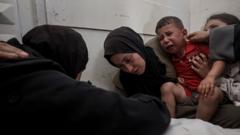As Israel eases its blockade, the flow of essential supplies into Gaza remains critically low, with locals struggling for daily sustenance.
Desperate Gazans Still Waiting for Aid Despite Blockade Easing

Desperate Gazans Still Waiting for Aid Despite Blockade Easing
Hopes for immediate humanitarian assistance in Gaza remain unmet, leaving many on the brink of famine.
Amid the ongoing humanitarian crisis in Gaza, reports indicate that, despite Israel’s announcement of an eased blockade on aid, very little food, fuel, and medicine have actually reached those in need. On May 21, it was reported that after days of anticipation, the situation on the ground remained dire for many Gazans. While dozens of trucks carrying supplies crossed into Gaza through the Kerem Shalom border crossing, delays in moving the aid to warehouses within Gaza meant that the essentials were not reaching the population.
A United Nations official, speaking anonymously due to the sensitive nature of the issue, noted that logistical concerns, particularly fears of looting, hindered the movement of aid trucks. This disruption left many residents, who had already faced a two-month blockade on basic necessities, in a precarious state. “Today we will mostly eat lentils, or pasta,” said Riyadh al-Housari, a 25-year-old residing in Gaza City, encapsulating the grim reality faced by his community.
The United Nations has warned that Gazans are at “critical risk of famine,” predicting acute malnutrition among tens of thousands of children if the blockade and associated restrictions continue. Israel has defended its position, arguing that the blockade is essential to pressure Hamas into negotiating terms to end the war and secure the release of hostages.
The situation remains fraught as delays continue and calls for humanitarian access grow louder. While aid organizations are eager to deliver much-needed supplies, the effective distribution within Gaza is uncertain, suggesting that the plight of the residents may persist for the foreseeable future.
A United Nations official, speaking anonymously due to the sensitive nature of the issue, noted that logistical concerns, particularly fears of looting, hindered the movement of aid trucks. This disruption left many residents, who had already faced a two-month blockade on basic necessities, in a precarious state. “Today we will mostly eat lentils, or pasta,” said Riyadh al-Housari, a 25-year-old residing in Gaza City, encapsulating the grim reality faced by his community.
The United Nations has warned that Gazans are at “critical risk of famine,” predicting acute malnutrition among tens of thousands of children if the blockade and associated restrictions continue. Israel has defended its position, arguing that the blockade is essential to pressure Hamas into negotiating terms to end the war and secure the release of hostages.
The situation remains fraught as delays continue and calls for humanitarian access grow louder. While aid organizations are eager to deliver much-needed supplies, the effective distribution within Gaza is uncertain, suggesting that the plight of the residents may persist for the foreseeable future.






















